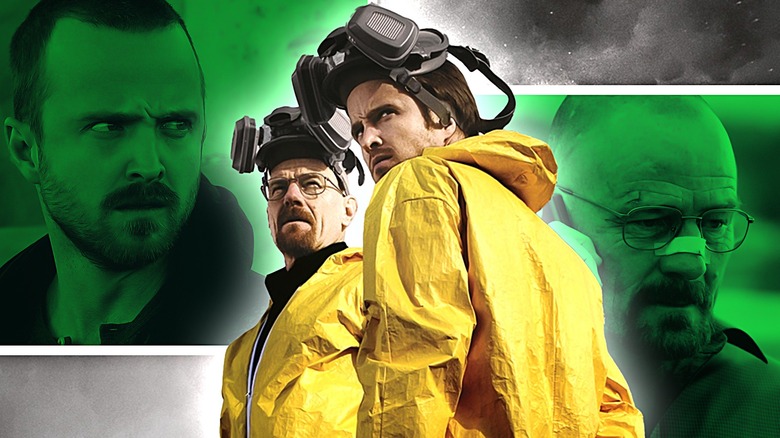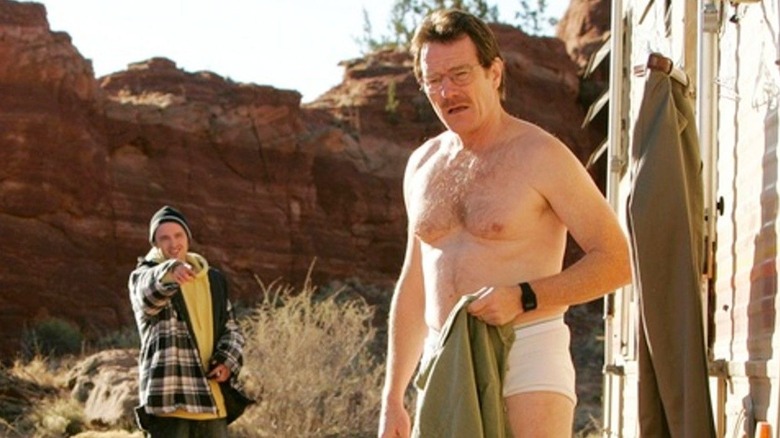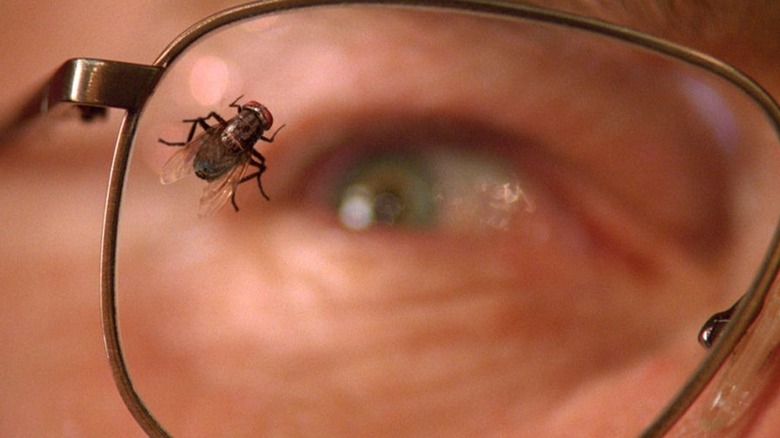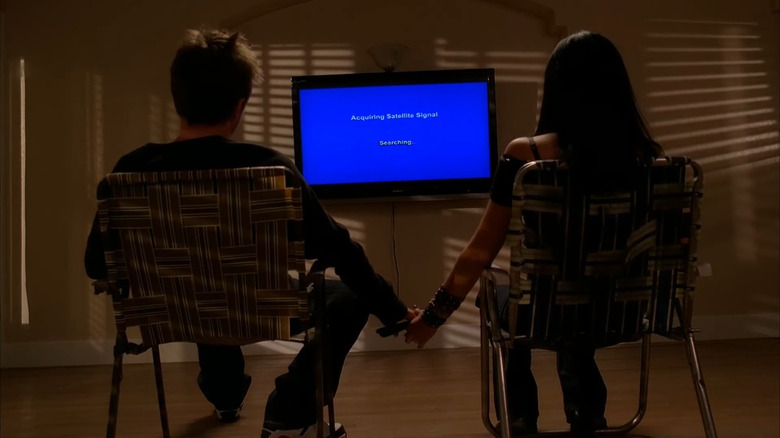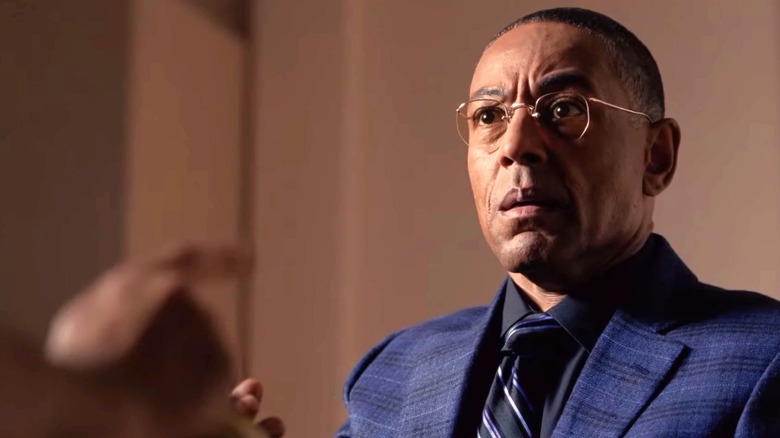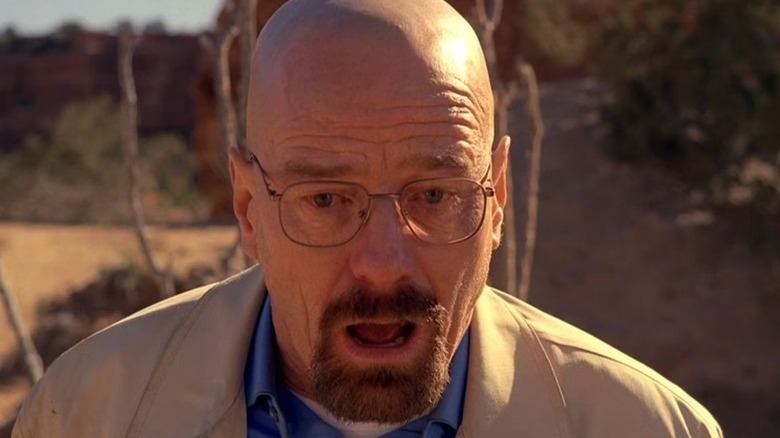Every Season Of Breaking Bad, Ranked
In the era of too much TV, when shows aren't given enough episodes to develop their characters or settle into a good rhythm, it's easy to forget that not long ago, we were living in a new golden age of TV shows. One series that helped define much of this era was "Breaking Bad," the show that was initially turned down by many networks before ultimately becoming one of the most celebrated and acclaimed TV shows of all time.
Across 62 episodes, the story of Walter White (Bryan Cranston), a chemistry teacher whose terminal cancer diagnosis prompts him to start a life of crime and become a meth kingpin, captivated audiences and only got bigger as the era of streaming kicked into overdrive. For five seasons (the last one being split in two, though we'll count it as one for the purposes of this article), we followed Walter's rise to power, the lies he told to his family and friends, and the many, many bodies that hit the floor in his wake. It was a show that dared viewers to push past the limits of what they'd accept from a protagonist, asking them how far they were willing to go to defend the actions of a character and find a point where they no longer sympathized with him.
It's been 16 years since the start of Walter White's journey, but after all this time, in the wake of TV changing dramatically yet again from the time this show was on the air, how does each season of "Breaking Bad" stack up? Here's how we see it.
5. Season 1
From the moment "Breaking Bad" opened with the sight of Bryan Cranston in his tighty whities — a look he had already perfected in "Malcolm in the Middle" — audiences were captivated by the story Vince Gilligan and his team were telling. Even Stephen King praised the opening scene as the moment he fell in love with the show and convinced him it was the best thing on TV.
Upon rewatches, the first season of "Breaking Bad" stands out as a brilliant tragicomedy, a genre that gained acclaim across multiple shows in the 2010s, from "Atlanta" to "Bojack Horseman" and more. The fish-out-of-water comedy of a high school teacher becoming a drug dealer, and Walter's scholarly approach contrasted with the impulsiveness of Jesse Pinkman (Aaron Paul), made for plenty of absurdist and hilarious moments even as the story never hid the fact that it was a rather dark crime drama.
As good as the first season is, however, it is very much the beginning of a much grander story with so many better moments and storylines yet to come.
4. Season 3
Season 3 is where "Breaking Bad" sheds much of its comedic tone and becomes a full-blown gripping drama, with the death of Jane and the plane crash at the end of season 2 signaling a point of no return for Walt and Jesse. Yet, this change doesn't happen overnight. This is a season where Walt attempts to leave his life of crime behind as his wife discovers his sins and tries to divorce him. It's the season where Jesse goes to rehab, where he gets better for a while as things temporarily look better for the heart and soul of "Breaking Bad."
And in true "Breaking Bad" fashion, it all comes crashing down by the weight of consequences. Hank getting caught in the Fring/Salamanca crossfire, Jesse being beaten to a pulp and realizing that his life has turned to hell after meeting Walt, and Walt's return to dealing as Jesse becomes hellbent on waging war on Gus Fring is absolutely riveting. The season has some of the best moments in the entire show, and is often considered a turning point where any doubts about "Breaking Bad" being one of the best shows of all time dissipate.
This is also the season where we get "Fly," one of the best episodes of TV of all time and a best-case scenario for budget constraints leading to a cheaper bottle episode that prioritized character over plot — something sorely missing in the era of streaming.
3. Season 2
Season 2 of "Breaking Bad" is an anomaly for the show, because it was actually planned in its entirety before cameras started rolling, and episodes were written as part of a cohesive arc, rather than developing the story as it goes along. That makes for the most cohesive season in terms of how it foreshadows the finale from the start, with the cold openings and even the episode titles all leading up to the reveal of the plane crash in the final episode.
Season 2 also perfectly walked the line between comedy and drama, introducing some of the best characters in the show like Jonathan Banks' Mike, Giancarlo Esposito's Gus, Krysten Ritter's Jane, and of course, Bob Odenkirk's Saul Goodman. The season gave us some spectacular episodes like "4 Days Out," which is as funny as it is filled with great character drama, it gets into the world of narcocorridos with a fantastic song by Los Cuates de Sinaloa, and is directly responsible for the creation of "Better Call Saul" — which many, including Guillermo del Toro, consider an even better show than "Breaking Bad."
After season 2, this series fully embraced its role as a drama and a tragedy, especially once we get to the end of Jane's story. But for 13 great episodes, we still had a phenomenal, poignant, thrilling, and often funny season of TV.
2. Season 4
The big feature "Breaking Bad" season 4 has going for it is that, sandwiched between Walt's rise to power in season 3 and his eventual fall in season 5, this season sees him degraded, powerless, and humiliated for most of the season. He spends many of these episodes getting beat up or insulted while Jesse slowly climbs the ranks of the business and becomes respected by Mike and Gus. It's also a fantastic season to see Walt's descent into madness, as he finally starts admitting to himself that he cares not about providing for his family but instead gaining power and recognition for himself, with the "I am the one who knocks" quote speaking to Walt's vision for himself and his legacy.
This is supported by a thrilling cat-and-mouse game between Walt and Gus as we start learning more about Gus and his decades-long revenge plot against the cartel, which results in a nail-biting season that starts at an 11 and never slows down. After all, the season begins with a brutal murder in cold blood with a box cutter that ups the ante and presents a different kind of villain than we'd seen up to this point — one who gets one of the most badass exits in modern TV history.
1. Season 5
This is it. This is what "Breaking Bad" was building toward, and the end result of the thought experiment of taking a character, as creator Vince Gilligan was fond of saying, from being Mr. Chips to becoming Scarface. Split into two halves, the first part of season 5 deals with the power vacuum left behind after the end of Gus and the cartel, with Walt and Jesse at their most ambitious and greedy. We get one of the most nail-biting episodes of the show with the train robbery, and the introduction of a fantastic villain in Jesse Plemons' Todd that sows the seeds of destruction for Walt.
But as good as that first half was, it's the second half of the season that truly cemented season 5 of "Breaking Bad" as one of the best TV shows of all time. It secured the legacy of the show by delivering a universally acclaimed ending, and an all-time great and heart-wrenching episode in "Ozymandias." The reckoning of Walter White finally arrives, and any doubt that he would simply get away with anything free of consequence was dissipated in "Ozymandias," which delivered unforgettable moments of violence and dark plot twists all centered on character development. Seeing the plot unravel, the web of lies come to light, and Walt's empire crumble is as satisfying as it is unbearably painful to watch — and that is the core of "Breaking Bad." If you haven't yet, be sure to check out our detailed breakdown of the making of the outstanding final season, which features exclusive interviews with many of the creative people responsible for bringing the show to life.
